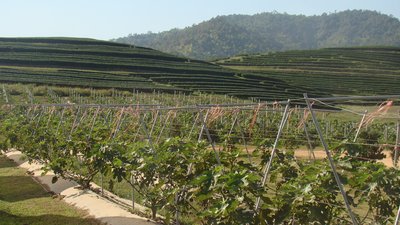CHIANG RAI, Thailand, Jan. 18, 2016 /PRNewswire/ -- Singha Corp, Thailand's leading beverage maker, is employing its vast management skills to focus on social and community enterprise through its famed Singha Park in Chiang Rai, a province in Thailand's Northern region.

The Park, known as Boon Rawd Farm, has a workforce of 1,200. Singha is investing 500 million baht (US$ 14 million) annually to boost its tourism and agriculture projects to benefit Chiang Rai.
Singha Park Managing Director Pongrat Luangthamrongcharoen says the Park's development in the past five years is part of Singha's support for local communities.
"Our goal is giving; giving to the local community. Let the community have the chance to benefit from Singha group's business success," Mr. Pongrat said.
The 3,000-acre Park is a major tourism draw card, receiving one million visitors a year.
Set among rolling hills stands the corporate's iconic Singha, a mythological lion, a popular site for photos.
Visitors enjoy the garden's tranquility, or ride bike trails, see exotic animals, ride the zip-line or take a farm bus tour.
The Bhu Bhirom Restaurant, located at the Park's highest point, offers diners splendid Park views.
Singha has launched projects to grow blueberries, strawberries, raspberries, and passion fruits, all this among a plantation of tea trees arching across the landscape.
While Singha is responsible for development, investment, marketing and logistics of the fruit, revenues flow back to the projects' employees and the communities.
"We won't be the middle men, that would squeeze the margin," Pongrat said. Planned fruit exports include to Europe. "We have to share what we have with those who have not had the opportunities," he said.
Saowaluk Chinnamat, 29, an agricultural scientist at the Park is optimistic at producing top grade blueberries otherwise imported to Thailand.
"We are confident that we can get the yields. We realize that it may never be like the original, but judging from the present it is possible of an 80 per cent success rate," Ms. Saowaluk said.
Chiang Rai province draws together at the borders of Thailand, Myanmar and Laos, offering a rich ethnic diversity. Many employees are Akha, Lahu, Burmese or Thai.
Agriculture worker, Ms. Meesae Mayer, a 34 year old ethnic Lahu, says at the farm she enjoys higher wages than at the village. "It has helped me. Without the job I for would not know how to help my family," Ms. Meesae says.
The Park's social enterprise work sustains support for local communities and awareness among Singha's staff of responsibility to a wider community.
For additional information, please email: trachoo_k@boonrawd.co.th